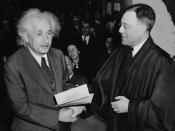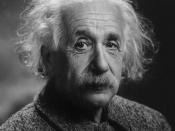1. Democritus: Greek philosopher, a central figure in the development of the atomic theory of the universe. Democritus' knowledge is largely limited to untrustworthy tradition. He was a wealthy citizen of Abdera, in Thrace. Democritus' physical and cosmological doctrines were an elaborated and systematized version of those of his teacher, Leucippus. Democritus asserted that space, or the Void), had an equal right with reality as he convinced the Void is a vacuum considering it existent Just as the atoms are uncaused and eternal, so too, according to Democritus, is motion. Democritus posited the fixed and "necessary" laws of a purely mechanical system, in which there was no room for an intelligent cause working with a view to an end. As he explained the origin of the universe. The original motion of the atoms was in all direction is "vibration." Democritus attributed popular belief in the gods to a desire to explain extraordinary phenomena by reference to superhuman agency.
His ethical system, founded on a practical basis, posited an ultimate good.
2.Epicurus: The Greek philosopher and author of an ethical philosophy of simple pleasure. Epicurus founded schools of philosophy that survived from the 4th century BC-4th century AD. Epicurus sincerely adopted the atomism of Democritus, maintaining that all objects and events, including human lives, are in reality but nothing more than physical interactions among minute indestructible particles. As they fall toward the centre of the earth, atoms swerve from their paths to collide with each other and form temporary compound beings. There is no necessity about any of this, of course, everything happens purely by chance.
3. Antoine Laurent Lavoisier: Antoine Laurent was known as a chemist, economist and a public servant. His most distinguished for this discovery on the role of oxygen played in combustion. The oxygen theory of...


